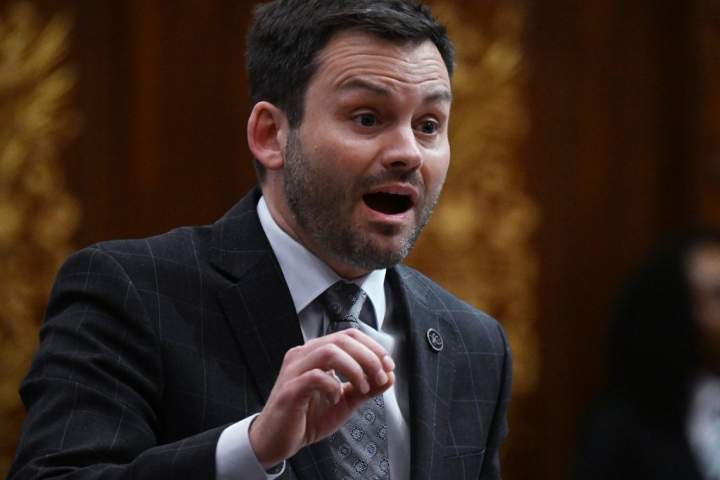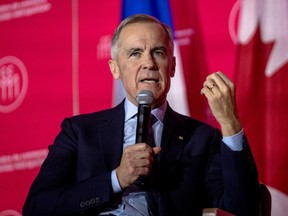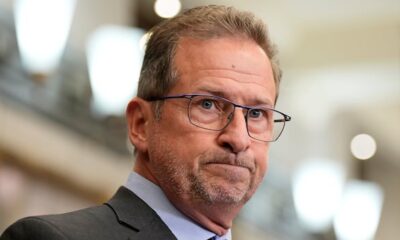Top Stories
PQ Pushes for Sovereignty Referendum Despite Public Opposition

URGENT UPDATE: The Parti Québécois (PQ) is insisting on a new referendum for Quebec sovereignty, despite a recent survey revealing that 65% of Quebecers would vote “No.” PQ Leader Paul St-Pierre Plamondon is undeterred, pledging to push for a third referendum if his party secures victory in the upcoming provincial election, now less than a year away.
In a heated statement, St-Pierre Plamondon argued that the current Canadian model undermines social peace: “The Canadian model is not only disrespectful, it’s illegitimate and a threat to social peace.” His comments came in light of federal funding for English-language health services in Quebec, which he views as a misuse of public funds. He emphasized, “I have nothing against obtaining services in English when you’re English-speaking, but I have a problem with wasting public funds that are our money with policies that are not democratic.”
The PQ is currently leading in voter intention polls, and St-Pierre Plamondon’s rhetoric surrounding Quebec’s separation from Canada is intensifying—30 years after the last sovereignty referendum in 1995. He dismissed the latest polling data, which shows public opposition to sovereignty, comparing it to discontent with current Premier François Legault: “Eighty-four percent of Quebecers don’t want François Legault, and that doesn’t prevent him from running in the next election.”
Meanwhile, opposition parties are expressing concerns that a referendum does not align with the pressing priorities of Quebecers. Pablo Rodriguez, leader of the Quebec Liberal Party, stated, “I want to talk about jobs, I want to talk about economic growth, I want to talk about health, I want to talk about education.” He warned that a referendum could destabilize the province: “A referendum brings a lot of instability.”
Rodriguez also stirred controversy by suggesting that Quebec could potentially sign the 1982 Constitution Act, a stance previously unendorsed by any Quebec Liberal leader. “The Constitution will be signed when we reach an agreement on Quebec’s conditions,” he declared.
Criticism from the current governing party, Coalition Avenir Québec (CAQ), was swift. Justice Minister Simon Jolin-Barrette condemned Rodriguez’s viewpoint, claiming it strays from the values of past Liberal leaders like Robert Bourassa and Jean Charest, who opposed signing the Constitution. Jolin-Barrette remarked, “Pablo Rodriguez still thinks that he’s in Ottawa and he’s the leader of the Canadian Liberal Party. He’s now in Quebec. He is the leader of the Quebec Liberal Party.”
As the PQ solidifies its position in the polls, the debate on Quebec’s future within Canada is set to take center stage in the province’s political landscape. With less than a year until the provincial election, all eyes are on how these discussions will unfold and impact voter sentiment.
Stay tuned for further updates as the situation develops, and watch for shifts in public opinion leading up to the crucial vote.
-

 Politics4 weeks ago
Politics4 weeks agoSecwepemc First Nation Seeks Aboriginal Title Over Kamloops Area
-

 World5 months ago
World5 months agoScientists Unearth Ancient Antarctic Ice to Unlock Climate Secrets
-

 Entertainment5 months ago
Entertainment5 months agoTrump and McCormick to Announce $70 Billion Energy Investments
-

 Science5 months ago
Science5 months agoFour Astronauts Return to Earth After International Space Station Mission
-

 Lifestyle5 months ago
Lifestyle5 months agoTransLink Launches Food Truck Program to Boost Revenue in Vancouver
-

 Technology3 months ago
Technology3 months agoApple Notes Enhances Functionality with Markdown Support in macOS 26
-

 Lifestyle3 months ago
Lifestyle3 months agoManitoba’s Burger Champion Shines Again Amid Dining Innovations
-

 Top Stories2 months ago
Top Stories2 months agoUrgent Update: Fatal Crash on Highway 99 Claims Life of Pitt Meadows Man
-

 Politics4 months ago
Politics4 months agoUkrainian Tennis Star Elina Svitolina Faces Death Threats Online
-

 Sports5 months ago
Sports5 months agoSearch Underway for Missing Hunter Amid Hokkaido Bear Emergency
-

 Politics5 months ago
Politics5 months agoCarney Engages First Nations Leaders at Development Law Summit
-

 Technology5 months ago
Technology5 months agoFrosthaven Launches Early Access on July 31, 2025





















